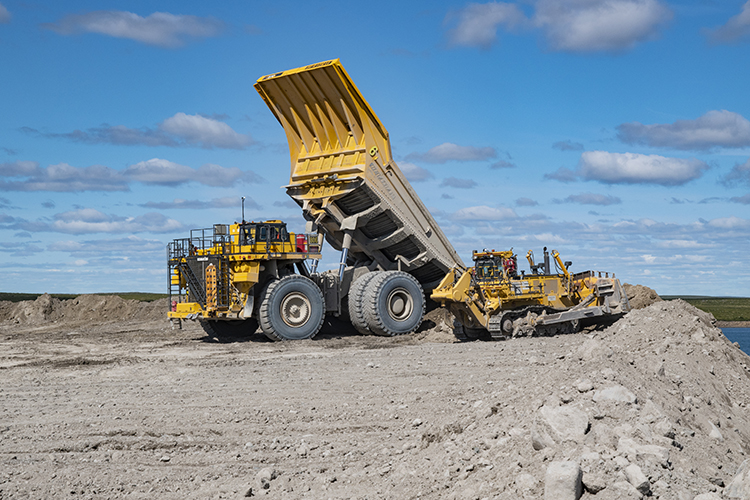Gahcho Kué diamond sales fall on weaker demand

Mountain Province Diamonds (TSX: MPVD) says lower prices and demand from India and China depressed sales by 15% last year from the Gahcho Kué mine in the Northwest Territories.
Revenue declined to $243.7 million from 2.7 million carats sold at an average value of $90 per carat compared with $297.3 million from the same amount sold at an average value of $112 per carat in 2022, the Toronto-based company said in a news release on Tuesday.
Sales suffered after India, the world’s largest gem cutter, imposed a two-month ban on diamond imports ending in December while China’s sluggish economy slowed buying by polishers and jewelry store restocking, Mountain Province said in reports this week and in November.
The mine, about 280 km northeast of Yellowknife, produced 5.6 million carats last year. It was the low end of a forecast for as much as 6.1 million carats after a mid-year processing halt. The stoppage lowered processing to 73% of capacity in the year’s first half and 84% in the second. Gahcho Kué nearly tripled ore processing during the fourth quarter compared to the year-ago period, making it the year’s strongest three months.
“We expect to carry this momentum into 2024 notwithstanding some expected seasonal reduction in performance numbers in the early months due to cold weather,” president and CEO Mark Wall said in the release. “The market is now reopened and we continue to monitor it closely to maximise value from our sales pipeline.”
Mountain Province operates Gahcho Kué in a 49-51% partnership with Anglo American (LSE: AAL) unit De Beers. Mountain is one of the last junior diamond companies in Canada as deposits dry up nearly 30 years after the heyday of exploration across the country’s north. In recent years, De Beers shut its Snap Lake mine near Gahcho Kué and its Victor mine in northern Ontario.
More kimberlites
Still, Mountain has 1,130 sq. km of mineral claims around Gahcho Kué including the Kelvin kimberlite estimated to contain 8.5 million tonnes grading 1.6 carats per tonne at a value of $63 per carat for 13.62 million carats. Its Faraday 2 kimberlite is estimated to contain about 2 million tonnes grading 2.63 carats per tonne at a value of $140 per carat for 5.4 million carats.
De Beers, the largest diamond producer by value, is looking for demand in China to increase in the medium-term as the Asian giant weathers stock and property markets turmoil. Sanctions on Russian state producer Alrosa will impact supply and greater scrutiny of ethical production will gather pace, the miner said last year.
“Global rough diamond production is not expected to fully return to pre-Covid levels in carat volume in the foreseeable future,” De Beers said in a report, citing Rio Tinto’s (NYSE: RIO; LSE: RIO; ASX: RIO) 2020 closure of the Argyle mine in Australia cutting 10% of world output. “While there are several notable diamond projects on the horizon that may be able to fill the gap to some extent, these projects will take some time to reach full production.”
It said new diamond projects include Luaxe in Angola by Alrosa and state miner Endiama planning to hit full annual production in 2027 of about 8 million carats; De Beers’ Chidliak project on Baffin Island, Nunavut, for 1-2 million carats a year by an unspecified date; and Lucara Diamond’s (TSX: LUC) Karowe mine underground expansion in Botswana due to add less than 1 million carats a year by 2028.
In Russia, Alrosa is planning the Mir project for 3 million carats a year by 2032; the Maiskaya project for 2 million carats a year in 2025; and the Vodorazdelnye Galechniki project for less than 1 million carats a year by 2026, De Beers said.
Closures and output rollbacks are expected at several large mines that could cut 17-20 million carats of annual production by 2030, or about 15% of 2022’s world output, the miner said.
These include Rio Tinto’s Diavik and Burgundy Diamond Mines’ (ASX: BDM) Ekati in the Northwest Territories. Burgundy acquired Ekati when it purchased its former owner Arctic Canadian Diamond last March for $136 million. Closures are also expected at Alrosa’s Nyurbinskaya and Almazy-Anabara mines in Russia, De Beers said.
{{ commodity.name }}
{{ post.title }}
{{ post.date }}




Comments